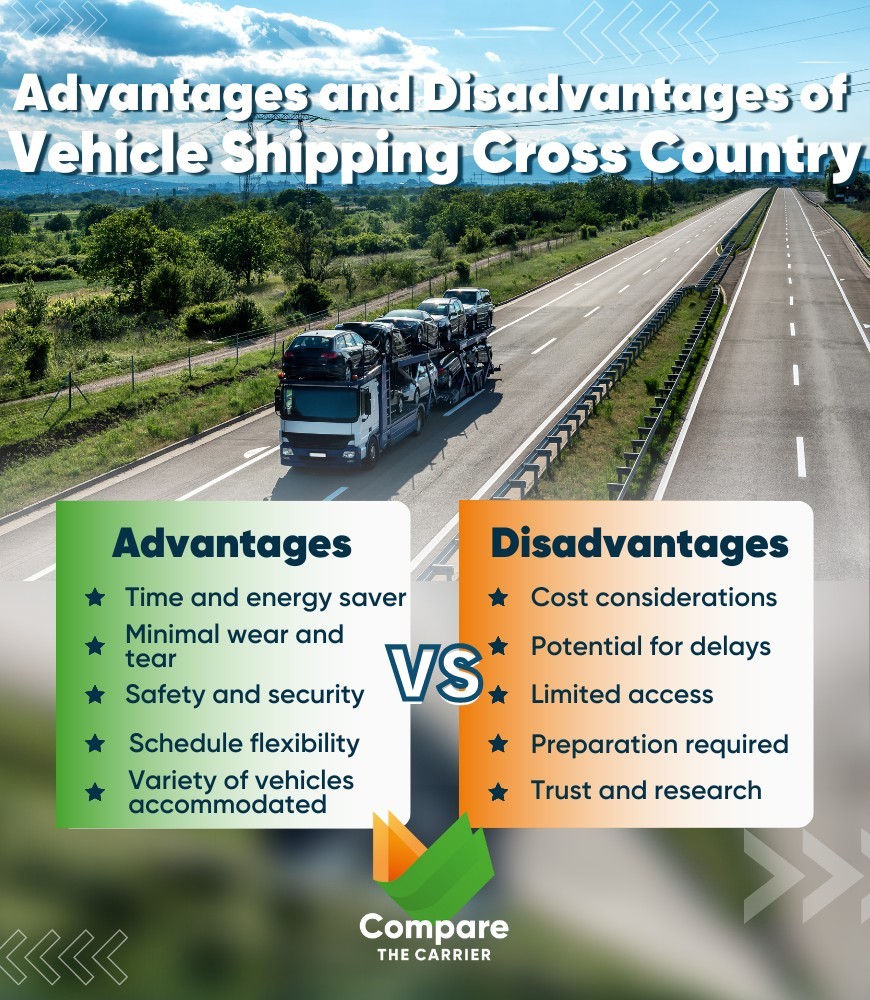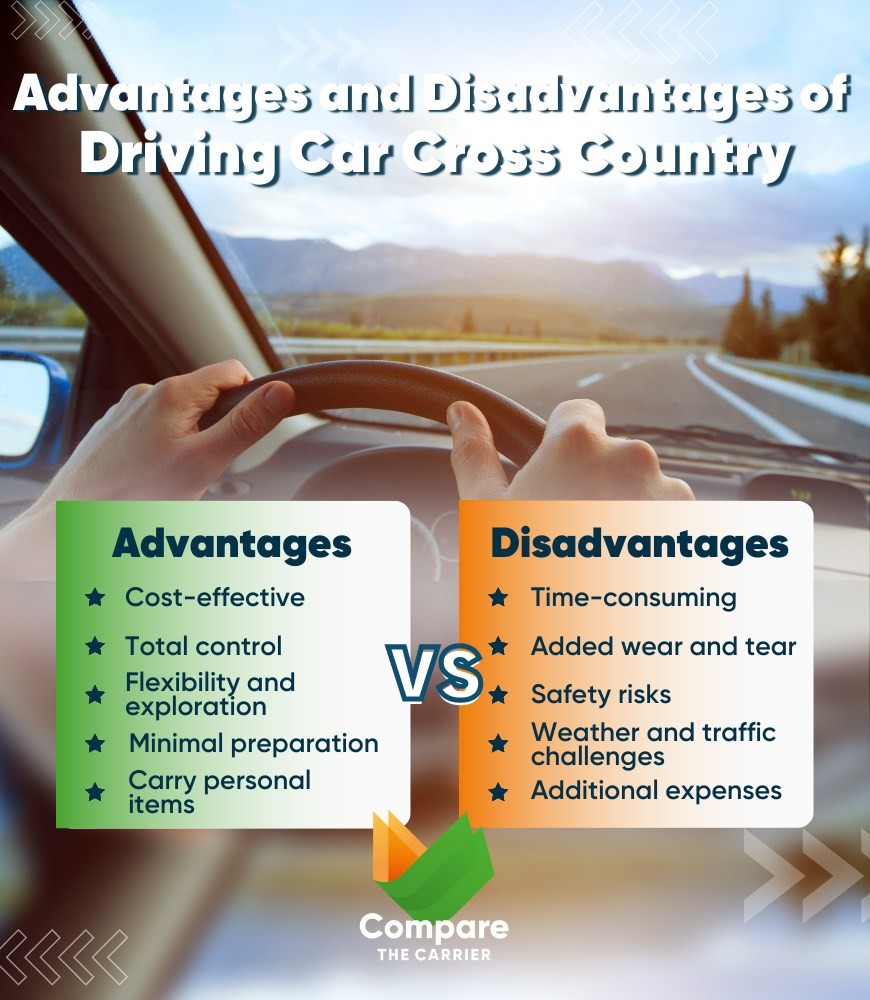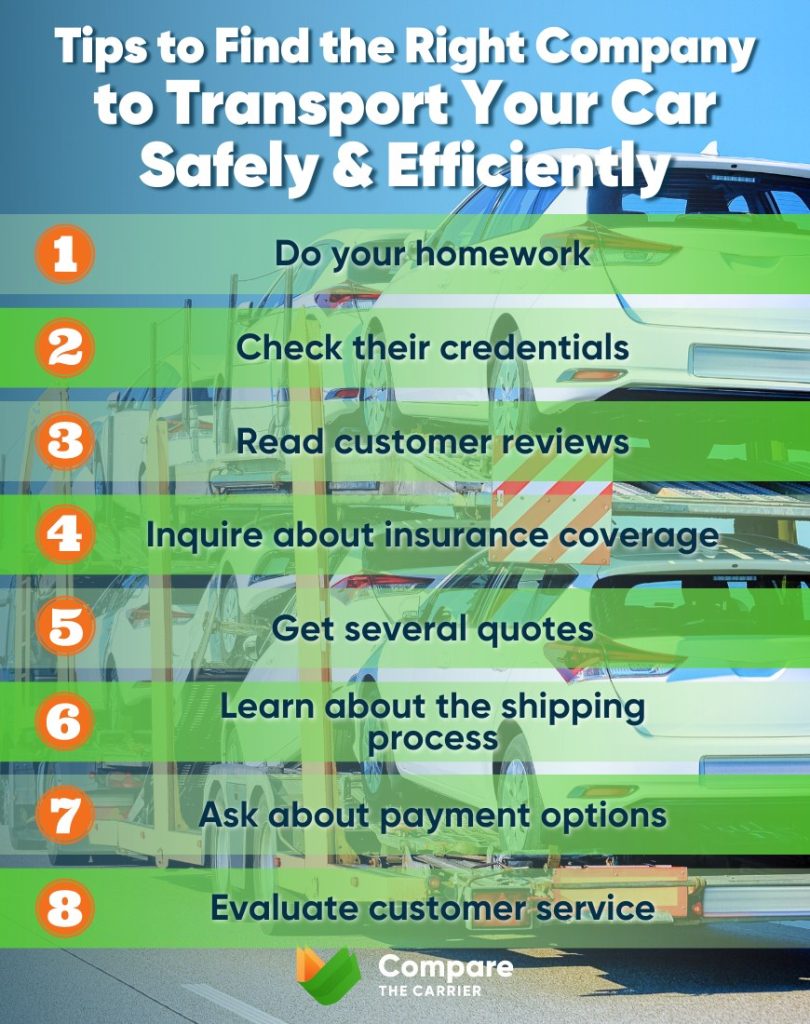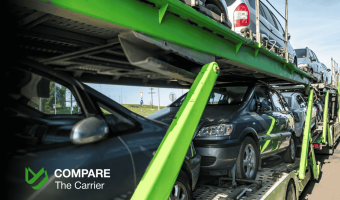Moving across the country is an exciting but stressful time. Along with packing your belongings and finding a new place to live, you also need to decide what to do with your car. Should you drive car cross country yourself, turning your move into a huge road trip, or opt for the convenience of professional vehicle shipping?
If you’re weighing your options, you’re in the right place. This article dives into the pros and cons of both driving and shipping your car across long distances. We’ll help you understand everything from cost and safety considerations to the best way to find a reputable auto transport company.
With Compare The Carrier, finding the best auto transport solution is now easier than ever.
Vehicle Shipping Cross Country: Pros and Cons
When faced with a long-distance move, deciding whether to ship your car or drive it yourself can be a difficult choice. Here, we’ll break down the pros and cons of shipping your vehicle to help you make an informed decision.

Advantages of Vehicle Shipping:
Disadvantages of Vehicle Shipping:
Cross country vehicle shipping comes with several advantages, such as saving time and energy, reducing wear and tear, providing safety and security, offering flexible scheduling, and accommodating various vehicles.
However, it also has some downsides, including cost considerations, potential delays, limited access, preparation requirements, and the need to find a reputable company. By carefully considering these pros and cons, you can determine whether shipping your vehicle is the right choice for your long-distance move.
Drive Car Cross Country: Pros and Cons
Deciding between shipping your car or driving it yourself for a long-distance move can be challenging. To help you make the best decision, let’s explore the advantages and disadvantages of driving your car cross country.

Pros of Driving Car Cross Country:
Cons of Driving Car Cross Country:
Driving your car cross country offers benefits such as cost-effectiveness, total control, flexibility, minimal preparation, and the ability to transport personal items.
However, there are also drawbacks, including the time-consuming nature of the journey, added wear and tear on your vehicle, safety risks, potential weather and traffic challenges, and extra expenses. By weighing these factors, you can decide if driving your car cross country is the best choice for your long-distance move.
Tips for Choosing a Vehicle Shipping Service Provider
When planning a long-distance move, it’s crucial to select a reliable vehicle shipping service provider. Follow these tips to find the right company to transport your car safely and efficiently:

By following these tips and thoroughly researching your options, you can confidently choose a vehicle shipping service provider that meets your needs and ensures a hassle-free transportation experience for your long-distance move. And remember, Compare The Carrier is here to help you save time and money by offering reliable shipping quotes from the best auto transport companies.
In conclusion, the decision to ship your car or drive it cross-country during a long-distance move boils down to your individual needs, preferences, and priorities. Carefully weigh the pros and cons of each option, keeping in mind factors such as cost, time, safety, and convenience. If you decide that shipping your vehicle is the right choice, use the provided tips to find a dependable and trustworthy service provider.
And don’t forget, Compare The Carrier is here to help you save time and money by connecting you with quotes from licensed and professional carriers, ensuring a smooth and worry-free experience. By making a well-informed decision tailored to your situation, you’ll be on the path to a successful and stress-free long-distance move.
FAQ
How much does it cost to ship a car cross-country?
The cost of shipping a car varies depending on factors such as distance, vehicle size, shipping method (open or enclosed), and seasonal demand. Prices can range from around $500 to over $1,500. To get accurate quotes, use Compare The Carrier to compare prices from multiple reputable companies.
How long does it take to ship a car cross-country?
Shipping times can vary based on the distance and shipping company’s schedule, but typically, it takes between 1-2 weeks to ship a car cross-country. Keep in mind that factors like weather, traffic, and other unforeseen circumstances may affect the delivery timeline.
Can I pack personal items in my car during shipping?
Most car shipping companies advise against packing personal belongings in your vehicle during transport, as these items are not covered by their insurance. Additionally, extra weight in your car may impact shipping costs.
Is it cheaper to drive or ship my car?
The cost-effectiveness of driving vs. shipping your car depends on factors such as distance, fuel costs, lodging, and meals. For shorter distances, driving may be more affordable. However, for longer cross-country moves, shipping could be more cost-effective when factoring in wear and tear on your vehicle.
How do I find a reputable car shipping company?
To find a reputable car shipping company, research multiple options, check their licensing and registration details on the FMCSA website, read customer reviews, and request quotes to compare prices and services. Using Compare The Carrier can help streamline this process by offering quotes from licensed and professional carriers.
Is my car insured during shipping?
Reputable car shipping companies typically provide insurance coverage for your vehicle during transit. Always request a copy of their insurance certificate and clarify any terms or conditions that apply to ensure your car is adequately protected.



![Most Popular Methods Of Cross Country Car Shipping [2026 Update] 7 7 cross country auto transport](https://comparethecarrier.com/wp-content/uploads/2022/03/Most-Popular-Methods-Of-Cross-Country-Car-Shipping-340x200.jpg)













